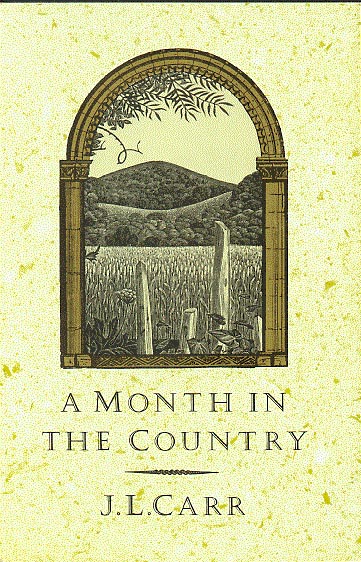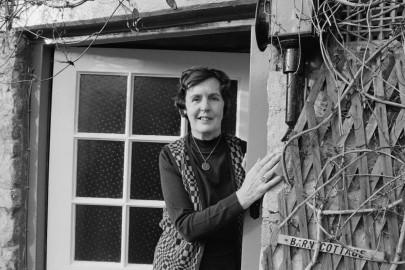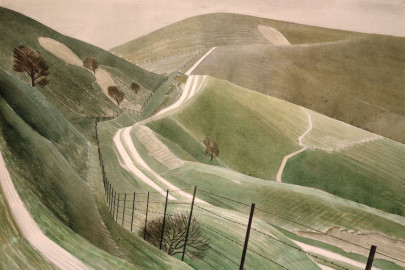In this 1p Book Review, Nige enjoys visiting “a world of strenuous hymn-singing in chapel and front parlour, huge teas and hellfire sermons”…
I’m not sure how long ago I first read J.L. Carr’s A Month in the Country – maybe 20 years – but when I spotted a copy of the Quince Tree Press paperback [other editions are available for a penny online – Ed] on the shelves of my Favourite Bookshop, I snapped it up, wondering what it would be like to read again this short sad tale, set in rural Yorkshire in 1920.
J.L. Carr was – as well as novelist, painter, teacher, mapmaker, dictionary-maker, Yorkshireman and ‘English eccentric’ – a great small-press publisher, and his Quince Tree Press books are wonderful little volumes (some of the them very little indeed). Not notably ‘beautiful’ productions (in the fine art sense), they are full of delights.
A Month in the Country has a perfect front cover design, incorporating part of a larger wood engraving by Monica Poole, and scattered around the endpapers are motifs by Thomas Bewick and Joan Hassall, while the text itself is illustrated by drawings by Christopher Fiddes (a little dense and heavy for my taste). The colophon includes this bold declaration of press freedom:
This is a Printing Office,
Cross-roads of Civilisation,
Refuge of all the Arts against the Ravages of Time.
From this place Words may fly abroad
Not to perish as Waves of Sound but fix’d in Time,
Not corrupted by the hurrying Hand but verified in Proof.
Friend, you are on Safe Ground:
This is a Printing Office.
Underneath this, Carr’s life is summed up thus:
James Lloyd Carr, born 1912, attended the village school at Carlton Miniott in the North Riding and Castleford Secondary School. He died in Northamptonshire in 1994.
His educational career was in fact almost the only undistinguished thing about J.L. Carr’s life – but no doubt he chose that curiously reticent epitaph himself…
As for A Month In The Country – rereading it, I found I’d remembered the core of the book very clearly: the love story, the uncovering of the medieval wall painting in the church, the long hot summer in the Yorkshire countryside, all of which were evoked every bit as vividly as I’d remembered.
What I’d forgotten was the bone-dry humour in the telling of the tale – and, especially, the narrator’s involvement with the Wesleyan Methodist chapel life of the Ellerbeck family, whose head is (as Carr’s own father was) the village stationmaster. This world of strenuous hymn-singing in chapel and front parlour, huge teas and hellfire sermons is clearly the world in which Carr grew up. In re-creating it so richly, he brings back to life what is so often missed in period fiction – the central place of religious faith, or at least observance, in virtually everybody’s world – a fact of life that lasted well into the 20th century, and seems so strange to us now, one of the things that make the past irretrievably the past.
Yet, above all A Month In The Country remains a tale – a classic tale, I think – of love and loss, and the pain of the past:
We can ask and ask but we can’t have again what once seemed ours for ever – the way things looked, that church alone in the fields, a bed on a belfry floor, a remembered voice, the touch of a hand, a loved face. They’ve gone and you can only wait for the pain to pass.












purchased! looks great
The loss I felt was of the time spent reading it. I took it up supposing that it had been written in about the period in which it was set, and was astonished to find that it was written in the 1970s. I have met with a number of varieties of historical novel, but one in the manner of a mediocre novel of the period depicted, I had not met, and do not understand. If you were to step out of a time machine and into 2050, would it not amaze you to find a novel written in the manner of (say) Jonathan Franzen, but with his weaknesses and not his strengths?
…by that reckoning George, should we discount Akenfield?
Akenfield by Ronald Blythe? Years ago I have a copy as a present, but beyond a page or two read at the recipient’s house, I have not looked into it. My impression was that it amounted to oral history. That has dangers of its own, and I have seen it abused–by those who make the scarcely literate sound like Samuel Johnson, and by those who make any old body sound like Tom Wolfe rendering a stock car driver. Yet I’m not sure that rendering somebody’s recollections as best one can is the same as writing “in the manner of”.
Or am I missing your point entirely?
Byron Rogers, who wrote a terrific biography of RS Thomas, wrote one of Carr: The Last Englishman. I think they share a Northamptonshire connection.
Obviously a contested title. For instance: The Last Englishman: The Double Life of Arthur Ransome By Roland Chambers (2009)